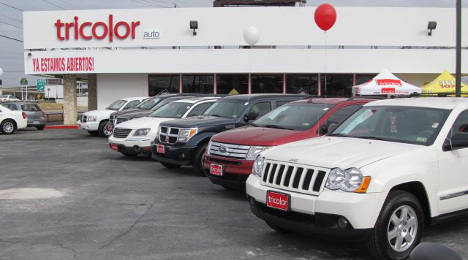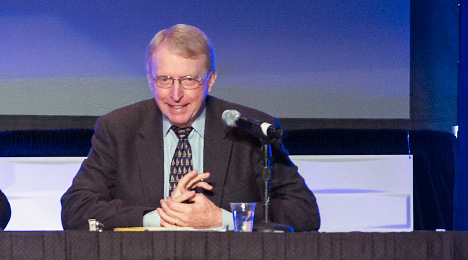Continuing a series about creating a strategy either to retire or at least depart from the business, Julian Codding — a member of the National Alliance of Buy-Here, Pay-Here Dealers Hall of Fame — pinpointed four main options BHPH operators could leverage.
In compiling this list of four choices, Codding reiterated that he is neither an attorney nor an accountant, but that these are the quartet of possibilities he discovered when he decided to wind down more than 40 years of full-time commitment to the dealership.
“The Bible is correct that for everything there is a season,” Codding said. “We’ve all known people who have retired, gone home, sat in a rocking chair and made everyone around them miserable. If the season has come for a change in your life, welcome it with the same positive attitude you did when you started your business.”
First, Codding noted that operators could do what he did, simply shut down the lot and collect on the vehicle installment contracts unit the reach maturity. If there is any inventory remaining, those units simply can be taken to auction while a finance company location remains in operation to continue to take payments and service the portfolio.
Next, Codding offered what he called the “50 percent times two rule.” Operators can cut their sales volume by 50 percent during the first six months of the wind-down process, cutting operator overhead. Then after six months, the remaining 50 percent is eliminated.
A third choice: operators can sell off their portfolio in one lump.
“Get one bid for everything with no recourse to you,” Codding said. “Get bids from finance companies first, and then if you trust one of your competitors, get a bid from them. They are in a position to pay more if they have the financial resources.”
Lastly, Codding mention that a BHPH dealer can take on a junior partner and go through a buy-out process.
“Many new-car dealerships have changed hands in this manner,” Codding said. “There are a lot of positive factors if the person you sell to is the right person and the controls are in place.”
If BHPH operators choose to take the last route, Codding suggested that the ending structure have $1 million in outstanding notes, a credit facility for floorplan, as well as a credit line for another $1 million to originate more contracts as well as have working capital available.
Once the plan is in place, Codding mentioned two other suggestions when dealing with two other important constituencies — store employees and dealership service providers.
“Your employees are going to be completely different the moment they know you are shutting down,” Codding said.
“Don’t be angry and blame them for it. Once again, it’s human nature,” he continued. “While you and I wouldn’t steal as a result, their attitudes are going to nevertheless change immediately.
“Your vendors are going to want to be sure you are going to pay them,” Codding went on to say. “If you are going to ask for some payment terms, be sure you deliver on your promise. They have been one of your ‘partners’ over the years.”
Now that he is not selling vehicles every day, Codding is offering his Hall of Fame wisdom to operators who are members of the NABD or who attend one of the organizations events such as the upcoming East Coast Conference in Orlando, Fla., on Nov. 3-5. Through his website, Codding indicated that he wants to reach out to operators who are making the investment in training and development through what’s offered by NABD.
Beyond a segment labeled Compliance University, the upcoming NABD East Coast Conference features dual-track workshop sessions starting at 3 p.m. ET on Nov. 3, covering BHPH best operating practices and compliance. The program features many of the nation’s leading attorneys, experts and successful operators who will share their latest tips and insights that bring success in the highly competitive subprime auto finance market of today.
The NABD East Coast Conference is scheduled for Nov. 3-5 at the Wyndham Orlando Resort International Drive in Orlando, Fla.
The complete agenda and speaker information is posted and will be continually updated on the NABD website at www.bhphinfo.com. Registrations can be made at the website or by calling (832) 767-4759.
Editor’s note: The first segment in this series when Codding touched on the two most important individuals operators should consult if they’re leaving the business can be found here.
For operators who still have questions about credit reporting of customer payments and more, Equifax, in collaboration with the National Independent Automobile Dealers Association and the National Alliance of Buy-Here, Pay-Here Dealers, is hosting a free webinar in support of the continued launch of the Equifax BHPH tradeline reporting program.
The initiative allows dealers who are members of either NIADA or NABD to report their consumer auto loans and payments data to Equifax without having to pass traditional barriers such as holding a certain number of accounts. As BHPH Report noted back in the summer, operators previously needed to have at least 500 active accounts to send this information.
Leading the hour-long session that begins at 1 p.m. ET on Tuesday is Angelica Jeffreys, vice president and dealer leader for Equifax.
Jeffreys plans to highlight three topics, including:
• Why tradeline reporting can help drive more profitable bottom line results
• An overview of the credit process and the governing bodies
• How the process works and tips on how to set it up efficiently
BHPH dealers can register for the session here.
Julian Codding, a member of the National Alliance of Buy-Here, Pay-Here Dealers Hall of Fame, recently decided to retire from a full-time commitment to his BHPH dealership, closing the lot and waiting for the remaining contracts to reach their terms.
To begin a two-part series from BHPH Report, Codding discussed the two most important individuals who operators should consult if they’re considering a similar decision. Emphasizing that he’s neither an attorney nor an accountant, Codding explained he developed his exit strategy based on four decades of day-in, day-out dealership experience.
“I want to share with you some of the things I’ve learned,” Codding said. “I learned these things the way I learned everything in life; most of the time the hard way and some of the time listening to people.
“I don’t assume any liability in my comments,” he continued. “I hope they are of some value to you. You must seek the counsel of a qualified attorney and accountant. Be sure they understand you and your business.”
Someone who likely understands your business most is the first individual Codding suggested that BHPH dealers should consult with if looking to leave the operation: immediate family.
“If you’ve spent (invested) years in building a buy-here, pay-here business, it certainly has been a family project,” Codding said. “Consult with your family. Give them time to reflect what the best business, personal and family decision is.”
Next, Codding recommended that operators move beyond their family sphere, tapping a trust friend who will tell you the “unvarnished truth.”
Codding indicated that most BHPH operators likely have a confidant whose judgment they value. He suggested that before engaging in a conversation with that trusted friend, dealers who are thinking about leaving the business should arrange their ideas in writing.
“An old boss used to make me write long detailed reports and then never read them,” Codding said. “His answer was, “If you don’t write it down, you don’t have a plan. You’re only talking.”
And Codding also mentioned a strategy to help operators determine who that trust confidant could be.
“By the way, do you know how to tell who your best friend in life is? It is simple. It’s the person that listens to you the best,” Codding said.
“A great friend will listen and then tell you what you might not want to hear,” he continued. “Those people are a treasure. It goes without says that the first best friend that will tell you what you might not want to hear is your spouse.”
Next, Codding touched on when BHPH dealers should have this discussion with their immediate family and trusted friends. He noted it should not be on a “really good day” when the store turned several vehicles in a single shift. Or it should not happen on a “really bad day” when customers won’t respond to collection calls or the repossessed vehicle appears to be a shell of what it was at the time of delivery.
“There’s a story of a fatigued Pope who one evening passed the private chapel near his bedroom in the Vatican. It was his habit to start and end each day there in prayer. He simply placed his hand on the chapel door as he passed one night and said ‘God, it is your church. I’m going to bed,’” Codding said.
“The other thing that can happen is a psychological profile identified as the Tahiti Syndrome as Tahiti means paradise in Tahitian,” he continued. “The profile is of a high stress, Type A personality who has worked him/herself to the point that when finally forced to take a vacation to Tahiti, refuses to come back. They won’t leave Tahiti for any reason. They become almost like a person who is scared to leave their home.
“Interestingly enough, within five years these individuals will have created some type of business or organization in Tahiti and will be on their way to re-creating another unbalanced life,” Codding went on to say.
Finally, Codding mentioned one other critical component to assembling a possible exit or succession strategy, especially how it pertains to employees and service and capital providers.
“Don’t tell anyone else until your plans are completely set,” Codding said.
Now that he is not selling vehicles every day, Codding is offering his Hall of Fame wisdom to operators who are members of the NABD or who attend one of the organizations events such as the upcoming East Coast Conference in Orlando, Fla., on Nov. 3-5. Through his website, Codding indicated that he wants to reach out to operators who are making the investment in training and development through what’s offered by NABD.
Beyond a segment labeled Compliance University, the upcoming NABD East Coast Conference features dual-track workshop sessions starting at 3 p.m. ET on Nov. 3, covering BHPH best operating practices and compliance.
The program features many of the nation’s leading attorneys, experts and successful operators who will share their latest tips and insights that bring success in the highly competitive subprime auto finance market of today.
The conference also will open with a first-time attendee reception.
“The compliance workshops will also include affordable compliance solutions which will help operators avoid legal and regulatory mistakes that can cost millions of dollars,” said NABD founder and president Ken Shilson, who added that upon completion, all attendees will receive a compliance certificate that proves their participation.
The Best Operating Track includes sessions on:
— Website design and content
— Technology solutions
— Payment devices
— Marketing strategies to gain market share
— Inventory sourcing and reconditioning
— Capital
The NABD East Coast Conference is scheduled for Nov. 3-5 at the Wyndham Orlando Resort International Drive in Orlando, Fla.
The complete agenda and speaker information is posted and will be continually updated on the NABD website at www.bhphinfo.com. Registrations can be made at the website or by calling (832) 767-4759.
Editor’s note: Watch for another upcoming feature coming in BHPH Report Extra where Codding goes into a more details about how operators can successfully exit the BHPH business.
Reporting consumer performance to a credit bureau certainly can boost a buy-here, pay-here dealership’s offerings to its customer base. But when the process isn’t completed properly, the mistakes can catch the attention of federal regulators, which happened to Texas-based Tricolor Auto Group on Wednesday.
The Federal Trade Commission said Tricolor will pay $82,777 in civil penalties as part of a settlement to address issues associated with the group’s related finance company. The FTC charged that Tricolor — which specializes in connecting with Hispanic customers at 16 locations in Texas and another lot in Oklahoma City — failed to have written policies and procedures regarding the accuracy of reported credit information and failed to properly investigate disputed consumer credit information.
“An inaccurate credit report can have a huge impact on consumers’ ability to make purchases, be hired and more,” said Jessica Rich, director of the FTC’s Bureau of Consumer Protection. “This case makes it clear that businesses must take the proper steps to make sure the information they provide to credit bureaus is accurate.”
The FTC’s complaint alleges that the company’s related finance company, Tricolor Auto Acceptance (TAA), violated the Furnisher Rule, which was implemented under the Fair Credit Reporting Act. The rule requires companies that report information about consumers to consumer reporting agencies (CRAs) to maintain policies and procedures designed to ensure that the information they report to CRAs is accurate and to allow consumers to dispute information they believe is inaccurate directly with the company that furnished the information.
While TAA provides information on thousands of consumers to one CRA, the FTC’s complaint alleges that TAA had no written policies or procedures addressing how to ensure the accuracy of that information.
The complaint further alleges that when consumers disputed the accuracy of the information provided by TAA to the CRA, TAA referred them back to the CRA instead of conducting an investigation as required under the Furnisher Rule.
In addition to the civil penalty, officials said that under the terms of the settlement TAA will be permanently barred from any further violations of the Furnisher Rule.
The FTC vote to authorize staff to refer the complaint to the Department of Justice and to approve the proposed stipulated final judgment and order was 5-0. The DOJ filed the complaint and proposed judgment and order on behalf of the Commission in U.S. District Court for the Northern District of Texas on Wednesday.
The proposed judgement and order — which can be downloaded here — is subject to court approval.
According to data Cross-Sell Reports, a division of Dominion Dealer Solutions, which collects the information via state departments of motor vehicles, Tricolor has sold 3,082 vehicles at its Texas locations during the first eight months of the year.
Earlier this year during a presentation at the National Alliance of Buy-Here, Pay-Here Dealers annual convention, Equifax highlighted five reasons why reporting customer performance to a credit bureau that meets federal mandates can benefit operators. Those elements included:
— Compelling value proposition for your customers to help them build their credit
— Provides incentive for consumers to pay their payments on time
— Mitigates consumer fraud and strategic repossession
— Enables accurate risk assessment
— Stay competitive
NABD will have more presentations and expert guidance available during its East Coast Conference for Buy-Here, Pay-Here coming up on Nov. 3-5. The event is being conducted at the Wyndham Orlando Resort International Drive in Orlando, Fla.
Organizers insisted BHPH dealerships of all sizes will benefit from the conference’s compliance track dubbed Compliance University from the knowledge to be shared by:
— Tom Hudson of Hudson Cook
— Gerald Sachs of Paul Hastings
— Terry O’Loughlin of Reynolds and Reynolds
— David Bafumo of FNI Inc.
— Mark Edelman of McGlinchey Stafford
— Allen Denson of Hudson Cook
— Trisha Cacciola of Hudson Cook
NABD highlighted the Wyndham Orlando Resort International Drive is newly renovated and located next to the hottest new attraction, the Orlando Eye. Shuttle service is available to Disney properties and Universal Studios. NABD has arranged discounted room rates of only $149 per night with no resort fees.
The complete agenda and speaker information is posted and will be continually updated on the NABD website at www.bhphinfo.com. Registrations can be made at the website or by calling (832) 767-4759.
Space and room availability is limited and early registration discounts are expiring soon. Space and room availability is limited and early registration discounts also are expiring soon.
Exhibitors can call Keith Shilson at (832) 767-4759 to learn more about space still available.
The National Alliance of Buy-Here, Pay-Here Dealers is bringing together seven of the most experienced, knowledgeable legal experts who have several decades of collective experience in the auto regulatory world for the 12th annual NABD East Coast Conference.
The conference theme is “More Success, Less Risk,” and the event is designed for both new and experienced operators. Organizers insisted BHPH dealerships of all sizes will benefit from the conference’s compliance track dubbed Compliance University from the knowledge to be shared by:
— Tom Hudson of Hudson Cook
— Gerald Sachs of Paul Hastings
— Terry O’Loughlin of Reynolds and Reynolds
— David Bafumo of FNI Inc.
— Mark Edelman of McGlinchey Stafford
— Allen Denson of Hudson Cook
— Trisha Cacciola of Hudson Cook
And more legal experts are expected to join other conference panels, too.
”This is the only compliance training designed specifically for BHPH operators. This is the greatest assembly of legal talent at one NABD event that we have ever assembled,” NABD president and founder Ken Shilson said.
NABD East Coast Conference is scheduled for Nov. 3-5 at the Wyndham Orlando Resort International Drive in Orlando, Fla.
Beyond the segment labeled Compliance University, the conference features dual-track workshop sessions starting at 3 p.m. ET on Nov. 3, covering BHPH best operating practices and compliance. The program features many of the nation’s leading attorneys, experts and successful operators who will share their latest tips and insights that bring success in the highly competitive subprime auto finance market of today.
The conference also will open with a first-time attendee reception.
“The compliance workshops will also include affordable compliance solutions which will help operators avoid legal and regulatory mistakes that can cost millions of dollars,” said Shilson, who added that upon completion, all attendees will receive a compliance certificate that proves their participation.
The Best Operating Track includes sessions on:
— Website design and content
— Technology solutions
— Payment devices
— Marketing strategies to gain market share
— Inventory sourcing and reconditioning
— Capital
Shilson highlighted these sessions feature leading experts and operators who will share ideas that succeed in the current environment.
“The workshops will not be infomercials and will benefit both owners and all key employees,” he said.
During the second half of the conference, the dual tracks will combine into the general sessions covering:
— Lease-here, pay-here program
— Using new technology to finance and source inventory
— Collections
— Repossessions
— Payment device best practices
— New benchmarks and trends update
— Accounting /tax tips and update
— Regulatory developments forecast
— Underwriting tips
— Top take-away session
“Both the workshops and the general sessions feature new content never presented before, and important information that will help attendees succeed,” Shilson said.
The conference ends at 1 p.m. on Nov. 5 to facilitate travel.
The exhibit hall will include all the latest products and services that increase BHPH profits and cash flow. Two receptions, a breakfast and a luncheon are included that are designed to allow attendees to network with other operators, experts and exhibitors.
NABD highlighted the Wyndham Orlando Resort International Drive is newly renovated and located next to the hottest new attraction, the Orlando Eye. Shuttle service is available to Disney properties and Universal Studios. NABD has arranged discounted room rates of only $149 per night with no resort fees.
“Attendees are encouraged to bring their families to enjoy the nation’s most popular family destination — Orlando,” Shilson said.
“Successful BHPH operators today must understand and adapt to the changing market environment. The old ways aren’t working anymore,” he continued. “This conference will definitely help attendees compete more successfully while avoiding the new regulatory pitfalls. The Orlando destination is an attractive and affordable venue.”
The complete agenda and speaker information is posted and will be continually updated on the NABD website at www.bhphinfo.com. Registrations can be made at the website or by calling (832) 767-4759.
Space and room availability is limited and early registration discounts are expiring soon. Space and room availability is limited and early registration discounts are expiring soon.
Exhibitors can call Keith Shilson at (832) 767-4759 to learn more about space still available.
With the closing weekend of August upon us, Hudson Cook senior partner and chairman Tom Hudson shared his Top 10 list of practices buy-here, pay-here dealers need to recognize so they not only avoid a bad month, but the possibility of being on their way out of business.
Items such as promissory notes, deal jackets and other written policies are all mentioned by Hudson, who will deliver a keynote speech with his predictions for the next five years in the business at Innovate: The Independent Dealer Industry Conference on Sept. 20-23 in Fort Worth, Texas.
“In my 42 years practicing consumer financial services law, I've seen a lot of egregious violations by dealers, but these top them all," Hudson said.
“Let's face it — the newer regulations are highly complicated,” he continued. “It can be tempting to just bury your head in the sand and pretend you’re doing fine. If you choose that route, though, it's only a matter of time before you get a big surprise in the form of an investigation or lawsuit.”
Hudson previewed his Innovate keynote speech by outlining these clues that your dealership might use to turn an extra vehicle or two to close the month but that might soon lead to an operation shut down:
1. You don't know the difference between promissory notes and retail installment contracts.
Many dealers call the contracts that buyers sign “notes,” but they aren’t. They are retail installment contracts. Notes and retail installment contracts are completely different documents, subject to different laws. Dealers who trade vehicles for signed contracts need to understand those contracts.
2. You charge cash buyers less than you charge buyers who finance.
This is one of the biggest red flags in today’s market and must be avoided at all costs. If the financed price is higher, regulators may conclude you added an undisclosed finance charge. You may also be in violation of usury laws.
3. Your idea of obtaining documents that comply with state and federal law is to photocopy the deal jacket documents from the last place you worked.
Many well-established dealers — both buy-here, pay-here and franchised — use documents that are outdated, designed for use in other states, copyrighted, crafted by lawyers who don't know what they are doing, or are otherwise invalid.
4. You don't know the difference between precomputed retail installment contracts and interest-bearing (so called "simple interest") retail installment contracts.
Some dealers use precomputed contracts and service them as interest-bearing contracts, and vice versa. This is a huge no-no.
5. You think all your prior experience in the car business, which consists only of dealerships that sell retail installment contracts to unrelated financing sources, is enough to get by.
If you are new to the buy-here, pay-here world, you absolutely must learn how the activities of servicing, collections, repossession and sale of repossessed vehicles are regulated. If not, you will be flying blind with regard to half of your business.
6. You don't budget for legal compliance costs in your ongoing expenses.
In addition to up-front formal training, you must pay real attention to compliance issues by participating in dealer associations and 20 Groups; reading industry publications; and creating, implementing, updating and funding a credible compliance program for your dealership. Dealers should also prioritize in-person training at conferences like Innovate with a wide variety of compliance courses.
7. Your accountant and your lawyer are not well-versed in the car business.
Missing critical tax or compliance advice because your accountant and/or attorney is inexperienced with dealers is a shortcut to the poorhouse.
8. You think you can just buy your advertising from an ad agency without taking responsibility for the content of the ads.
Operation Ruse Control, led by the Federal Trade Commission and 32 law enforcement partners, resulted in 252 enforcement actions against dealers. The FTC is on a tear over dealer ads, and dealers need to understand that they are responsible for what their ad agencies do.
9. You don't have written policies for privacy safeguarding, red flags, underwriting, servicing and all your other compliance responsibilities.
Maintaining up-to-date policies is one of the clearest ways you can communicate your good faith effort to comply with regulations.
10. You think you don't need to worry about this compliance stuff because you “take good care” of your customers.
Unfortunately, it just doesn't work that way anymore. Inevitably, something will tip off a lawyer or regulator, and you will wish you had your legal house in order.
To get more detailed, real-world knowledge on buy-here, pay-here law, operators can join Hudson and some of the most-respected legal experts in the country at Innovate: The Independent Dealer Industry Conference, Sept. 20-23 in Fort Worth, Texas.
The event will feature more than 80 different classes — all more than an hour long — that dive deep into compliance, collections, finance, accounting, operations and more.
Officials insisted Innovate is one of the only events or independent dealers and finance companies with two full compliance tracks, which by themselves cover 16-20 different topics.
“In total, attendees will access more than $10,000 in legal insight for the price of admission,” organizers said.
AutoStar and DealerSocket, its parent company, expect more than 600 attendees at this year's conference, including major exhibitors and financial institutions that will showcase the latest dealership technology, best practices and industry solutions.
To view the full schedule or buy tickets, visit www.MyInnovate2015.com.
Transparency. Education. Information. Repeat.
Unless you’ve been living under a rock, it’s pretty clear that the Consumer Financial Protection Bureau expects consumers to receive these things from their financial service providers. Earlier this month, the CFPB once again demonstrated this when publishing a report on its “Know Before you Owe” electronic closing (eClosing) project that it recently conducted in the mortgage industry.
What’s this got to do with auto finance and the buy-here, pay-here industry? Read on.
The project, which took place over a four-month period, involved a combination of technology companies, real estate professionals and 3,000 consumers, of which 1,200 completed surveys about their experience in mortgage closings. The results indicate that “those consumers who closed their mortgage using an electronic platform are generally better off on measures of understanding, efficiency, and feeling empowered than borrowers who used just paper forms.”
The CFPB focused on three areas: consumer understanding, process efficiency and feeling of consumer empowerment. In each area, the study found that eClosings improved the customer experience.
“While technology alone will not address all consumer concerns in the closing process, our study showed that eClosings do offer the potential to make the process less complex,” CFPB director Richard Cordray said. “The CFPB believes that the eClosing process has the potential to give consumers more time to review closing documents while also providing them with educational tools that can help them navigate the closing process more successfully”, concluded the report.
It’s obvious that the CFPB will continue to expand upon the adoption of eClosings in the mortgage industry. In fact, the “Know Before You Owe” mortgage disclosure rule, which goes into effect in October, will require that consumers be provided with two new informational forms well before closing.
This presents the question of whether auto finance will be faced with a similar initiative, since director Cordray has stated that auto loans and leases are among the most complex and significant transactions in a consumer’s life.
The worlds of auto finance and mortgage lending are very different.
For one, the underwriting requirements of mortgage lenders prevent immediate closings. Also, it is virtually impossible for a consumer to read at closing the voluminous number of the closing documents a consumer is required to sign, thus the bureau’s mandate for delivery of information prior to closing.
However, they are both similar in that they represent significant financial commitments by the consumer. Therefore, we can expect that the CFPB will apply pressure for both industries to treat its consumers similarly and look for the best ways to educate and inform them so that they can make responsible choices.
While electronic contracting has been used in auto finance for several years and creates an efficient process, it doesn’t address the other two areas that the CFPB focused on in the mortgage study — consumer understanding and empowerment — which are natural by-products of transparency, education and information.
While a more efficient process is nice, dealers need to realize that the CFPB really wants the industry to take steps to provide more and better information to its customers.
Fortunately, the auto finance industry already has tools at its disposal. Menu selling, which standardizes the after-market product offerings of a dealer, has become more widespread in recent years. Also, many dealers have their customers view videos that provide valuable information about products and services to the consumer.
SecureClose — disclaimer here is that I helped to develop it — is a product that provides consumers with a standardized presentation of the terms and conditions of the contracts, allows them to navigate through the documents at their own pace, and actually records the consumer’s participation in the closing. Reynolds and Reynolds DocuPad and Dealertrack’s eContracting product offer similar educational benefits.
The goal of these and any similar products are to educate the consumer and, therefore, empower them, which creates a better customer experience and, hopefully, a better customer.
A dealer not looking to use these tools still has to be proactive and search out opportunities to inform and educate its customers and build a more transparent process. Study the closing process and find ways to include more information so your customers are educated.
Are there product brochures or materials that can increase a customer’s knowledge? If so, don’t just leave them out around the dealership; instead, make them a part of the presentation.
If multiple after-market products are offered at your dealership, create your own menu and be sure to include standardized pricing.
Take advantage of the FTC pamphlets that educate consumers on car buying and financing. Every dealer should offer them to its customers.
Transparency. Education. Information. If you’re doing business like it’s 2010 then you aren’t adopting industry best practices and you aren’t accomplishing these goals. Change, improve and aim to be better than the rest.
Steve Levine is the chief legal and compliance officer of SecureClose. He can be reached at (817) 875-0621 or [email protected].
If you’re a relatively new operator who has never participated in a 20-group style meeting or a veteran dealer who is looking for a fresh collection of professionals to gather ideas, the National Alliance of Buy-Here, Pay-Here Dealers is hosting its next event that’s designed specifically for these reasons.
The NABD Boot Camp is a two-day event set for Aug. 22-23 where attendees get the chance to see a dealership that’s been in business for more than 20 years in action. NABD co-founder Ingram Walters literally opens the doors to his back-end office where underwriting is completed, his reconditioning center and site of his related finance company for his operation, iCars, which is located just east of Charlotte, N.C.
NABD co-founder and president Ken Shilson also delves into a host of topics important to the success of BHPH dealers, including the establishment and monitoring of an RFC, what static pool analysis can reveal about a portfolio as well as what capital providers might be available.
The boot camp also provides ample time to interact with fellow attendees as well as the chance to sit down and have some one-on-one conversations with both Shilson and Walters.
“If you want to make the rest of 2015 and 2016 better for your operation, you need to attend the boot camp,” said Shilson, who also mentioned there are only a set amount of attendee openings and they’re filling quickly.
To get more information, watch the above video, visit www.bhphinfo.com or call (832) 767-4759.
Especially in these times of intensive regulator oversite, Automotive Compliance Consultants president Terry Dortch insisted that how your buy-here, pay-here dealership responds to customer complaints often determines whether the store’s good name gets blemished or a lawsuit results.
Viewed proactively, Dortch explained complaints can help BHPH dealers identify process and personnel weaknesses to be corrected.
Dortch acknowledged that every dealer knows about customer complaints. But if operators are not hearing them personally, he mentioned that perhaps a visit to review websites like Consumer Affairs will be enlightening.
Automotive Compliance Consultants has found that most review sites like this one contain a number of positive reviews, but their share of negative ones about various dealerships, as well.
Dortch wondered how many complaint reviews might have never reached social media had dealers responded to customer concerns more appropriately, expediently and kindly.
The firm emphasized that proper response to customer complaints is part of an effective compliance management system (CMS). This system describes correct processes for complaint follow-up and other best practices for ensuring BHPH dealership compliance with prevailing laws regulating the business.
“A dealer can have put into place the right practices to ensure the business operates according to these various laws, but if no set policy and responding practices are put in place for handling customer complaints, the CMS is broken,” Dortch said.
Automotive Compliance Consultants specializes in dealership and auto finance compliance, providing in-dealership consultations and analysis, compliance audits and training, and offers solutions for all compliance needs.
When establishing a complaint response system, the firm explained a dealership should consider:
• The types of complaints received, and how to categorize them. Those from a regulatory agency, and complaints regarding Equal Credit Opportunity Act claims should be placed in their own category.
• How complaints are to be received and by which individual or individuals within the dealership.
• How complaints will be documented, how information will be gathered about the complaint, information about the individual making the same, and each contact with the customer.
“Respond promptly and appropriately, whether in your estimation a complaint has merit or not, as certainly someone believes you violated their rights and certainly their emotions,” Dortch said.
“Ignore complaints or respond in a way that dismisses or demeans the customer and you’ll likely germinate a potential lawsuit,” he continued.
After receiving, logging and responding to complaints, Automotive Compliance Consultants recommended that BHPH operators use them to improve the business, as they likely point to:
• Weaknesses in sales and finance processes
• Employees that may be exposing the dealership to risk
• Needed improvements in customer handling
• Broken compliance practices
• Need for remedial employee compliance training
The Automotive Compliance Consultants staff has extensive experience in the retail automotive industry and focuses exclusively on dealership compliance issues.
For more information, contact Dortch at [email protected] or visit www.compliantnow.com.
The National Independent Automobile Dealers Association is organizing its own resources along with colleagues from Oregon’s independent dealer association in an effort to prevent a bill from becoming law in the Beaver State that could radically alter how buy-here, pay-here dealers can operate.
Officials from the Oregon IADA and the newly created NIADA Buy-Here, Pay-Here Commission explained the measure — Senate Bill 276 — contains eight elements that “would completely rewrite the rules” for dealers who provide financing for credit-challenged customers
Among them are requirements for BHPH dealers to:
• Obtain the same type of license from Oregon’s Department of Consumer and Business Services (DCBS) as payday or auto title lenders.
• Cap interest rates at no more than 20 percent or the federal funds rate plus 17 percent, whichever is lower.
• Reduce interest rates to account for the amount of the consumer’s down payment.
• Form a good faith belief that the consumer has the ability to perform on the contract by using underwriting standards passed by DCBS.
• Stop accruing interest once a vehicle has been repossessed.
• Wait to repossess a vehicle until after 30 days from when nonpayment has occurred.
• Cap repossession fees at 7.5 percent of the purchase price.
• Stop using GPS or starter-interrupt devices.
“Obviously, the bill is as comprehensive a regulatory framework as would exist in the country,” NIADA regulatory counsel Shaun Petersen said. “And it’s wholly unworkable for the industry.”
Petersen indicated the task of NIADA, OIADA and the BHPH Commission was to educate the Oregon legislature and DCBS about what the buy-here, pay-here industry does, how it works and how dealers provide customers who are unable to get conventional financing with much-needed transportation.
Working with the Oregon IADA, the NIADA BHPH Commission contacted and mobilized BHPH dealers in the state to explain to their legislators the adverse impact the bill would have on the industry. The commission reached out to BHPH dealers across the country as well to inform them about the Oregon bill and the need to mobilize against it to avoid similar legislation coming up in other states.
Furthermore, NIADA hired Shawn Miller, a longtime advocate for various industries in Oregon, to contact key lawmaker and encourage them not to let the bill become law. Miller and Petersen also met with the legislative and policy staff of DCBS to inform the agency about the independent dealers associations, the industry and the impact the bill would have on consumers, dealers and the Oregon economy.
“Our association's identification of and quick response to Oregon SB 276 is exactly the kind of action we envisioned the NIADA BHPH Commission taking when it was formed," NIADA executive vice president Steve Jordan said.
“Having a place at the table when legislators are considering bills that will negatively impact our BHPH members is critical, and just plain good for the industry,” Jordan continued.
Currently, the bill is pending before the Senate Business and Transportation Committee. Jordan emphasized NIADA, OIADA and the BHPH Commission are continuing our efforts to oppose the bill on behalf of our members and the used vehicle industry as a whole.
For more information about what’s developing in Oregon, contact Petersen at (614) 939-9955 or [email protected].
The measure in Oregon isn’t the only one aimed at the BHPH industry. Legislation is also being debated in both New Jersey and New York.












